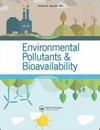Translocation and accumulation of heavy metals from the rhizoshphere soil to the medicinal plant (Paeonia Lactiflora Pall.) grown in Bozhou, Anhui Province, China
IF 3.2
4区 环境科学与生态学
Q2 BIOCHEMISTRY & MOLECULAR BIOLOGY
Environmental Pollutants and Bioavailability
Pub Date : 2023-06-15
DOI:10.1080/26395940.2023.2223768
引用次数: 1
Abstract
ABSTRACT The concentration of heavy metals (HMs) in soil-plant systems was an important indicator of soil heavy metal pollution, and the migration and transportation abilities of HMs from soil to plants were of great significance for evaluating food safety and reducing health risks. This study was conducted to investigate the contamination and translocation of HMs in the soil-Paeonia lactiflora system in Bozhou, Anhui Province, China. The soil pollution was assessed by calculating the Geoaccumulation index (Igeo), Potential ecological risk index (RI), and Pollution load index (PLI). The transfer ability of HMs was evaluated by using the bioconcentration factor (BCF) and translocation factor (TF). The results showed that Fe, Mn , Cr , and As were the priority pollutants in soil. Paeonia lactiflora presented high potential to translocate Zn, Cu, and Fe from soil to roots, and had strong ability to translocate HMs except for Cd from roots to stems and leaves安徽亳州药用植物(芍药)根际土壤中重金属的转运和积累
本文章由计算机程序翻译,如有差异,请以英文原文为准。
求助全文
约1分钟内获得全文
求助全文
来源期刊

Environmental Pollutants and Bioavailability
Chemical Engineering-Chemical Health and Safety
CiteScore
4.30
自引率
3.00%
发文量
47
审稿时长
13 weeks
期刊介绍:
Environmental Pollutants & Bioavailability is a peer-reviewed open access forum for insights on the chemical aspects of pollutants in the environment and biota, and their impacts on the uptake of the substances by living organisms.
Topics include the occurrence, distribution, transport, transformation, transfer, fate, and effects of environmental pollutants, as well as their impact on living organisms. Substances of interests include heavy metals, persistent organic pollutants, and emerging contaminants, such as engineered nanomaterials, as well as pharmaceuticals and personal-care products as pollutants.
 求助内容:
求助内容: 应助结果提醒方式:
应助结果提醒方式:


